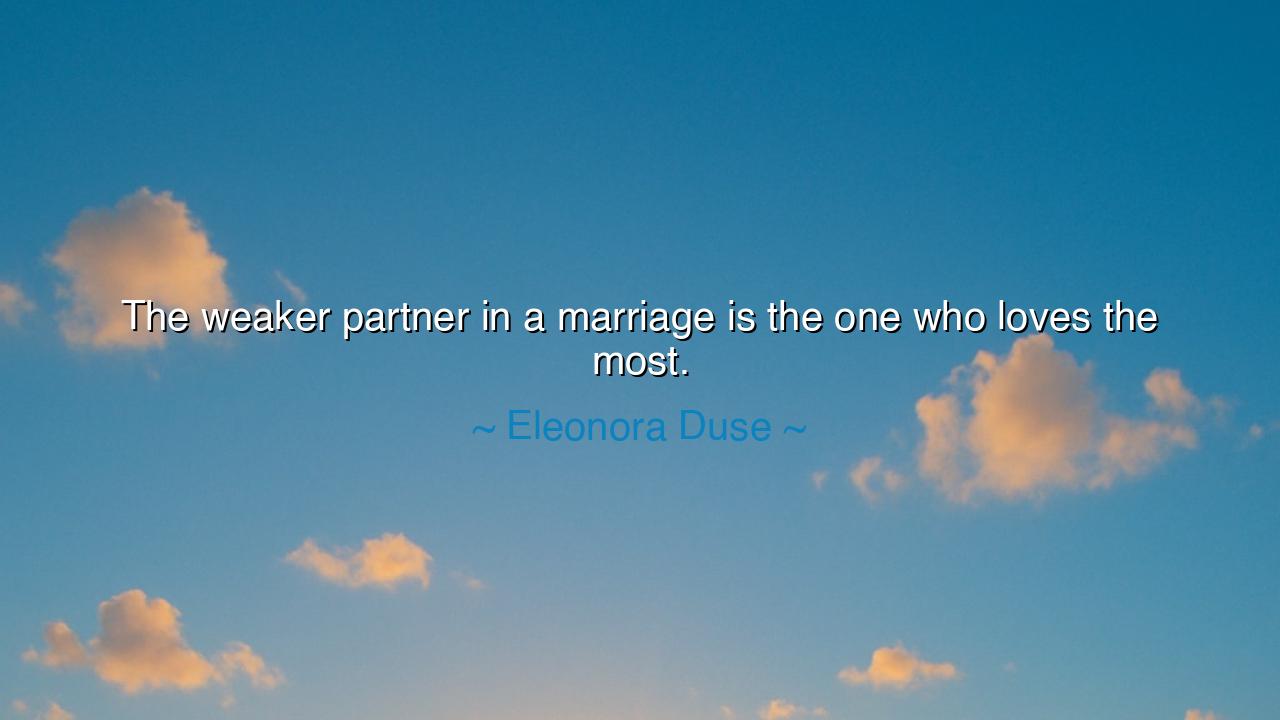
The weaker partner in a marriage is the one who loves the most.






"The weaker partner in a marriage is the one who loves the most." These words by Eleonora Duse strike at the very heart of the human experience, for they speak to the often unspoken truth about the nature of love and power in relationships. In a world that often praises strength, independence, and dominance, Duse’s statement challenges our conventional wisdom. The one who loves deeply, she suggests, is the one who surrenders, who gives freely and unconditionally, and in doing so, becomes vulnerable. Love, in this view, is not about asserting power or control over another, but about a willingness to give oneself, to sacrifice for the happiness and well-being of the one you cherish. Love, in its purest form, makes one open to the possibility of suffering, for in loving another, we expose our hearts to both the highest joys and the deepest wounds.
In the ancient world, the concept of love and power in relationships was often explored through the lens of myth and legend. Consider the story of Orpheus and Eurydice from Greek mythology. Orpheus, the legendary musician, loved Eurydice with such depth that when she died, he descended into the underworld to bring her back. His love for her was so pure, so consuming, that it led him to the very gates of death. And yet, in the final moment, when he was told not to look back at her, his love—his deepest desire—overcame his willpower, and in that moment, he lost her forever. Orpheus, in loving with such intensity, became the weaker partner, for his love blinded him to the warning, leaving him vulnerable to the very fate he sought to escape. His devotion made him suffer not because it was weak, but because his heart was so open and willing to give that it cost him everything.
Similarly, the great tragic love between Antony and Cleopatra exemplifies this idea. Antony, a Roman general, was so deeply in love with Cleopatra that he was willing to forsake his political career, his country’s future, and even his own honor for her. His love for Cleopatra made him vulnerable to manipulation and ultimately led to his downfall. While Cleopatra also loved him, her position as the ruler of Egypt gave her a certain strength that Antony lacked. She was the stronger partner in the relationship, for while Antony’s love was all-consuming, hers was tempered by political ambition and power. In this sense, Antony’s deep love for Cleopatra left him weaker—emotionally and politically—because he was willing to sacrifice everything for a love that ultimately led to his undoing. Duse’s words echo the fate of those who love too deeply—they are often weakened by their attachment, making them vulnerable to forces beyond their control.
This theme also appears in the life of Abelard and Heloise, two of the greatest lovers in medieval history. Abelard, a philosopher, and Heloise, his brilliant student, shared a passionate love that defied the conventions of their time. Their love was intense, and their bond was so deep that Abelard willingly sacrificed his career and reputation to be with her. Yet, when their relationship became known, Heloise was forced to suffer an immense loss—Abelard was castrated, and their love was torn apart. Heloise’s love, like Orpheus’ and Antony’s, left her deeply vulnerable. Her intense devotion to Abelard led her to endure great emotional and physical suffering, showing that sometimes, the one who loves the most is the one who suffers the most. The great tragedy of their relationship is a testament to the strength of love, but also to the weakness that arises when we love so fiercely that it leaves us open to pain and loss.
The lesson in Duse’s quote is not one of discouraging love, but one of understanding the nature of sacrifice that accompanies it. To love deeply is to surrender oneself, to make oneself vulnerable to the whims of fate and the actions of another. Love, in its truest form, requires a kind of selflessness that often leads to personal weakness, not because the love is insufficient, but because it is so all-encompassing. It is a powerful force, one that binds us to others in ways that are both beautiful and painful. When we love, we allow ourselves to be weakened in the sense that we place our hearts in the hands of another, trusting them to carry our most tender emotions. This act of vulnerability can lead to growth, but it can also open us to the possibility of heartbreak.
However, there is strength in this weakness, for it is through this willingness to give of ourselves that we find the true power of love. The weaker partner, in the act of giving, is not necessarily powerless but is showing the strength of commitment, loyalty, and the willingness to put the other’s needs before their own. To love deeply is to understand that selflessness is not weakness but a form of strength—the strength to give, to endure, and to sacrifice without expectation of return. In this way, love becomes a fortress that sustains us, even when we feel vulnerable.
So, dear listener, as you reflect on this wisdom, ask yourself: What is the true nature of my love? Are you willing to be vulnerable, to surrender your heart and trust another with your deepest emotions? Understand that in loving fully, you may find weakness, but it is a weakness born from the most beautiful and authentic form of strength. Let selflessness, not self-interest, guide your relationships, for in this, you will find the deepest fulfillment. Love deeply, but remember that in loving, you give part of yourself, and in that giving, you create a bond stronger than any force of nature.






AAdministratorAdministrator
Welcome, honored guests. Please leave a comment, we will respond soon